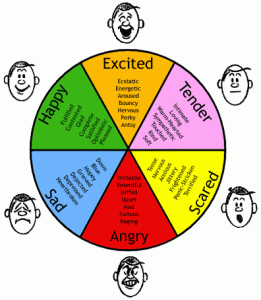You’re in the grocery store with your 4 year old, in a hurry, stressed. You have to buy something for dinner, and get home to cook it fast so you can take your 9 year old to soccer practice. You had a bad day at work. Right in front of the check-out counter, in that wide area where all the other shoppers are standing and waiting to check out, your 4 year old flings a major fit. Yep, complete with yelling, falling on the floor and crying.

Your 11 year old comes home from school complaining about how nobody likes him, and he has too much homework. The bus driver accused him of doing something that he didn’t do and now he is getting punished for it. The school lunch was terrible, his teacher hates him and life is unfair.
Your 16 year old daughter wants to go to the school dance with a boy that you don’t know and you don’t know his parents and you just generally don’t want to release her yet. When you tell her “No” she cannot go, she yells at you that you are the meanest parent ever and stomps out of the room, slamming the door behind her.
How do you handle these scenarios?
All parents have been, or will be, in similar situations. Times when it will be necessary to help your child deal with and handle his emotions. In order to do this, you, as a parent, will have to be able to deal with and handle your emotions. (See Parenthood:Thing 1 and Thing 2 for more on your emotions.)
So let’s take a quick look at a concept that will be helpful to understand, Emotional Intelligence (EI). EI is a skill that we can learn and that we can teach our children.
If you have never heard of emotional intelligence before, listen up. If you have heard of it, here is a refresher course.
Simply defined, emotional intelligence is the ability to understand what we are feeling and why, the ability to manage our emotions, the ability to notice emotions in other people and the ability to use our emotions to relate to other people.
Research has shown that people with Emotional Intelligence skills are more successful in work situations, do better in school and have better relationships. Sounds like something we would all want for our children, right? Also, children with EI skills are more resilient when bad, uncomfortable or unfair things happen to them. Which they will in this world.
We learn EI skills by relating to other people. As parents, we have a huge opportunity to model and teach these skills to our children. So with that in mind, here are four basic ways that we can help our children become more emotionally intelligent.
- Be available and accessible to your child. When relating to your child treat him with respect, develop empathy for him and model assertiveness.
- Help your child identify and name his feelings. Sometimes a child won’t even know what he is feeling. When you as a parent are empathetic, you can guess what he might be feeling and give it a name. Children need to have a good “emotion words” vocabulary.
- Encourage your child to talk about his feelings. A child needs to know it is okay to talk about feelings, both good and bad. This will help him to not be a “feelings stuffer”.
- Validate your child’s feelings. In other words, let him know that it is okay to feel whatever he is feeling. Then, help him express his feelings in healthy ways to the right people.
Using these skills with your child will help him feel good about himself and his world. And when a child feels good, his behavior is less likely to be bad.
So consider this…..
Do you understand your own emotions well enough to help your child understand his?
Are there ways and times when you have noticed that relating to your child in an emotionally healthy way has been beneficial?
Since God created us as relational beings, wouldn’t it be wonderful to help your child be able to relate well to other people (especially you!)?
For more on this and a great read for anyone with children, I recommend Raising an Emotionally Intelligent Child by John Gottman.